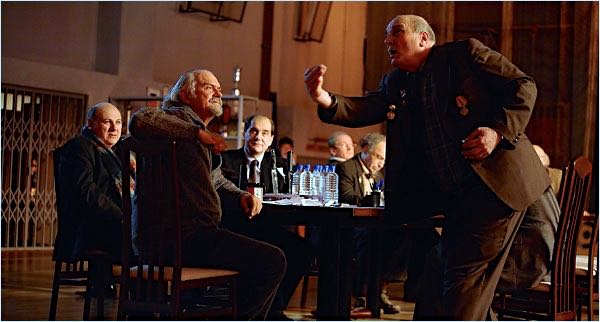By Ray Bennett
VENICE, Italy — Sidney Lumet turned Reginald Rose’s fine play “12 Angry Men” into a splendid movie in 1957 and it has been revisited on stage and television but never better than in Russian filmmaker Nikita Mikhalkov’s triumphant new film version titled simply “12.”
Screened in competition at the Venice International Film Festival, the film takes the plot of a dozen jurors who must decide the fate of an accused murderer and expands it into an examination of modern Russia. The essential debate about democratic justice remains, but with the defendant a Chechen youth charged with killing his Russian stepfather, it permits an illuminating exploration of the post-Soviet era as each juror reveals his background, life choices and prejudices.
Mikhalkov and co-writers Vladimir Moiseenko and Alexandr Novotosky have created a sturdy and intelligent screenplay that alternates humor and stark drama with flashbacks to horrific incidents in war-torn Chechnya. The staging is convincing, the acting is exceptional, and the tension never flags despite the film’s 153 minutes.
Prospects are high for worldwide audience interest in a film that demonstrates all the attributes of first-class, grown-up filmed entertainment, and it will probably collect some awards along the way.
Mikhalkov, whose “Burnt by the Sun” won the 1995 Academy Award for best foreign language film, demonstrates a masterful hand behind the camera and also takes the role of a man whose calm efficiency leads the other jurors to accept him readily as chairman.
The film begins with the 12 unnamed men as they are herded into makeshift quarters next to the court, a school gymnasium with plenty of room but a dodgy electrical system. The two-month long trial is only visited in the dialog between jurors, although that is cleverly enhanced by recreations of elements of the crime.
Witnesses claim to have seen and heard the Chechen youth, who is seen occasionally pacing in his cell, argue with his stepfather and yell: “I’ll kill you.” A knife made for hand-to-hand combat and said to be available only in the boy’s homeland is also key evidence.
The first vote is 11-1 in favor of conviction. The sole dissent is by an apparently mild-mannered man (Sergei Makovetsky) who says that he thinks there should at least be some discussion. Everyone is keen to make a decision and go home, but he says that he needs to talk about it because a guilty decision will mean the boy will be imprisoned for the rest of his life. He agrees to join the majority if everyone else remains in favor provided the next round is a secret ballot.
But then there are two. An elderly Jewish man (Valentin Gaft) votes not guilty because he recalls that the lawyer for the defense looked bored throughout the proceedings and he now thinks it wasn’t a fair trial.
Like the original play and Lumet’s film but very different in all the particulars, “12” shows how the voting changes as the members of the jury respond to persuasion and react to debate. They range from bigoted Muscovite cab driver (Sergei Garmash) to diffident TV executive (Yuri Stoyanov) to cavalier musician (Michael Efremove).
Expansive use of the enclosed space, well photographed by Vladislav Opeliants, emphasizes the smallness of the defendant’s cell and jump-cuts to vicious and extremely well-staged firefights ramp up the tension.
On the way to a smartly unexpected climax, the film provides insight into many of the social and historical issues that burden modern Russia but that are hardly unique to that country.
Cast: Nikita Mihhalkov, Sergei Makovetsky, Sergei Garmash, Michail Efremov, Yuri Stoyanov, Valentin Gaft, Aleksei Petrenko, Sergei Gazarov; Viktor Verzhbitsky, Alexei Gorbunov; Roman Mayanov; SergeiArtsybashev, Aleksandr Adabashyan, Apti Magamaev; Director: Nikita Mikhalkov; Writers: Nikita Mikhalkov, Vladimir Moiseenko, Alexandr Novotosky; Producers: Nikita Mikhalkov, Leonid Vereschagin; Director of photography: Vladislav Opeliants; Production designer: Victor Petrov; Music: Edward Artemiev; Costume designer: Natalia Dziubenko; Editors: Andre Rigaut, Vincent Arnardi; Production: Three T Productions; No MPAA rating, running time 153 minutes

